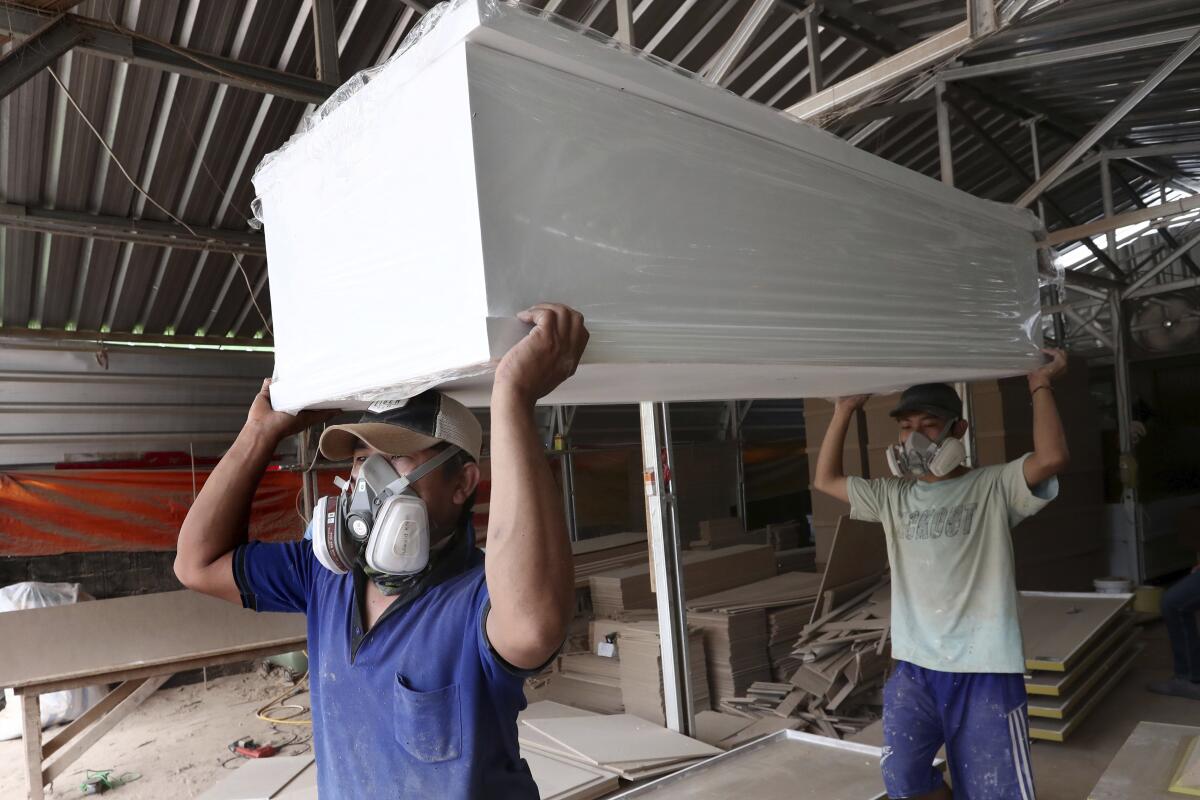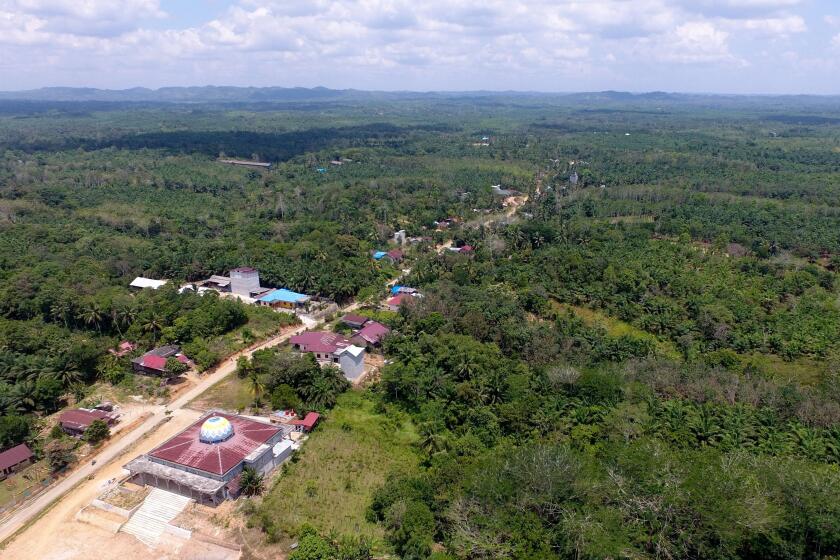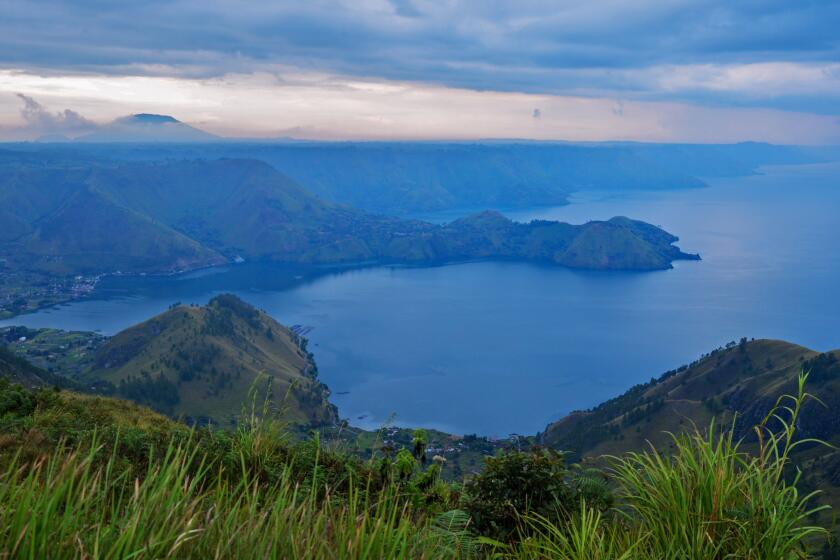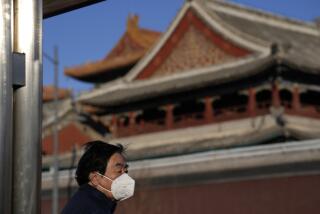Dying doctors. Too many coffins. Indonesia late in battle against coronavirus

- Share via
SINGAPORE — The president’s herbal remedy didn’t work, and the cost is heavy across Indonesia: Medical workers wear raincoats and garbage bags to guard against a killer disease. Gravediggers struggle to keep up with a surge of plastic-wrapped coffins. And an army of migrant workers face hunger as the economy slips toward recession.
The world’s fourth most populous country is paying a stiff price for its delayed response to the coronavirus. The crisis, which could result in thousands more dead by next month, was probably avoidable, health workers and policy experts say.
The central government didn’t impose major restrictions on movement and gatherings until April 10, almost six weeks after a dance instructor in West Java was identified as the first of thousands of Indonesian COVID-19 patients.
“We had almost two months to prepare,” said Kamila Fitri, a doctor at a hospital in the capital, Jakarta, the outbreak’s epicenter, who hasn’t seen her home in a month because she doesn’t want to risk infecting her parents and two younger siblings. “Compared to other countries, we reacted too late.”
Fitri and her medical colleagues have been worried since February that hospitals would be overwhelmed in a country that has seven times fewer doctors per capita than the United States. While countries across the region were reporting hundreds of cases, Indonesia seemed to be suspended in a state of denial — claiming the nation of 270 million was virus-free, despite having direct flights to the city of Wuhan, where where China’s outbreak began.
Using a playbook reminiscent of the Trump administration’s, Indonesian President Joko “Jokowi” Widodo downplayed the severity of the outbreak in favor of preserving the economy, which has been decimated by the lack of tourists to places like Bali. He touted an unproven herbal remedy to ward off the disease and watched as his health minister attributed the lack of cases to the power of prayer.
By mid-March, when the seriousness of the situation could not be ignored, Jokowi said his government had known all along the virus was dangerous but didn’t want to “stir panic.”
A haphazard strategy of social restrictions issued in some jurisdictions and rejected in others has arisen. The government also resisted releasing detailed information about cases — a reflection of a leadership dominated by ex-military figures determined to maintain central authority. Dozens have been arrested under a draconian defamation law for posting comments deemed critical of the official response.
“As in many other countries, the Indonesian government was reluctant to face up to the magnitude of the impending pandemic,” said Ben Bland, director of the Southeast Asia program at the Lowy Institute in Sydney, Australia. “But it maintained its willful blindness for longer than others, and, once it came, its response has been slow, piecemeal and confusing.”
That has taken a toll on doctors and nurses: “We’re terrified,” said a general practitioner working at a government hospital in the coastal city of Labuan Bajo who didn’t want her name published because she wasn’t authorized to speak to a reporter. “We’re using homemade face shields. Doctors are developing mild symptoms. Three have been quarantined.”
The government appears to be partly hoping Indonesians can endure one more disaster in a country accustomed to earthquakes, tsunamis, ferry sinkings and plane crashes.
Indonesia could be trading one environmental disaster for another when it relocates its capital from Jakarta to East Kalimantan, a hotbed of coal mining, gas extraction and palm oil production on the giant island of Borneo.
Comprising 17,000 islands across three time zones, the country had only one coronavirus testing facility until recently.
It has since increased the number of labs to 38, but testing per capita remains among the lowest in the world. The government has conducted about 50,000 tests since April 1, fueling widespread speculation that the case count of 8,211 (as of Friday) and death toll of 689, including at least 26 doctors, is significantly higher.
Some point to the surge in funerals as evidence the numbers are amiss. The 4,400 burials recorded in Jakarta last month was 40% higher than any month since at least January, 2018, Reuters reported after reviewing more than two years of statistics from the city’s Department of Parks and Cemeteries.
Researchers at the University of Indonesia had been warning there could be 140,000 deaths and 1.5 million cases by May without the stringent social distancing that has only recently been introduced.
Some of those measures are upending traditions in the world’s largest Muslim-majority country. The holy month of Ramadan, which began Thursday, will have to be observed at home this year. No longer can Indonesians visit mosques or break fast with family and friends at restaurants after sundown.
The annual exodus, or mudik, of migrant workers that takes place at the end of Ramadan has also been postponed. Known as the Idul Fitri mudik, the migration usually clutters Indonesia’s roads as millions leave the capital.
The economic impact will be severe as workers are stuck in Jakarta with no way to earn money and rural communities are left without the financial boost of returning relatives.
“Those who mudik would bring money and gifts for their family members back home,” said Charlotte Setijadi, an anthropologist at Singapore Management University. “It’s a way to maintain kinship ties across an urbanizing and changing Indonesia, so it’s an important ritual for millions of people.”
Tumiyem, a 54-year-old street vendor, who, like many Indonesians, goes by one name, said this year during mudik her children and grandchildren had planned to visit her and her husband in Jakarta. With that trip now canceled, the vegetable seller says her chief concern is stanching three weeks of diminishing earnings.
“My friends here also are experiencing the same,” she said. “But I don’t complain because I know that some other people experience worse than us.”
Containing the coronavirus will be especially hard in Indonesia because few can afford to stay indoors. Millions belong to an informal economy that lives hand to mouth.
Diro, a ride-hailing motorcycle driver in Jakarta who declined to provide his last name, said he would need government assistance if he couldn’t work. The postponement of mudik also means the 25-year-old can’t return to his hometown in Central Java and fall back on his family for support — something he’s now reluctant to do.
“I’m afraid if I go back home, I could spread the virus there,” he said. “I may look healthy, but I don’t know if the virus is already inside me.”
Christians in Indonesia’s Lake Toba are pushing back against plans to promote halal tourism, as religious and ethnic tensions simmer in the Muslim-dominated country.
Researchers say postponing the migration will not matter if the outbreak isn’t contained in Jakarta, a city of more than 10 million. Early data suggest moves in mid-March to close schools and make office employees work from home helped bring the disease’s reproductive rate from as high as four (meaning for every infected person, four others got the disease) down to two, according to Panji Hadisoemarto, an epidemiologist at Padjadjaran University School of Medicine in Bandung, Indonesia.
After the new measures were introduced April 10, which included restricting gatherings of more than five people, the rate dropped to 1.2.
“I have doubts the social restrictions have been effective enough, so far, to drive the reproductive number to the level that we want, which is below 1,” said Hadisoemarto, who recommends extending the restrictions to June.
The country announced Friday that it would ban all domestic air and sea travel for at least the next five weeks.
Doctors at the government hospital in Labuan Bajo are bracing for an onslaught of infected migrants who have already left Jakarta. Dozens with COVID-19 symptoms have already come in, but confirming their status has been nearly impossible.
The doctor who spoke on condition of anonymity said she’s been waiting more than two weeks for swab results to return from Jakarta, 900 miles away.
“I’m not sure if the tests are still viable because it’s been so long,” she said.
Pleas for more personal protective equipment have gone unanswered. Staffers there are restricted to one surgical mask per day. To overcome a shortage of coveralls, they wear raincoats. And instead of face shields, they tape transparent plastic sheets over their goggles.
“The central government didn’t take COVID seriously,” the doctor said. “So no one was prepared for this.”
Special correspondent Dames Alexander Sinaga in Jakarta contributed to this report.
More to Read
Sign up for Essential California
The most important California stories and recommendations in your inbox every morning.
You may occasionally receive promotional content from the Los Angeles Times.













